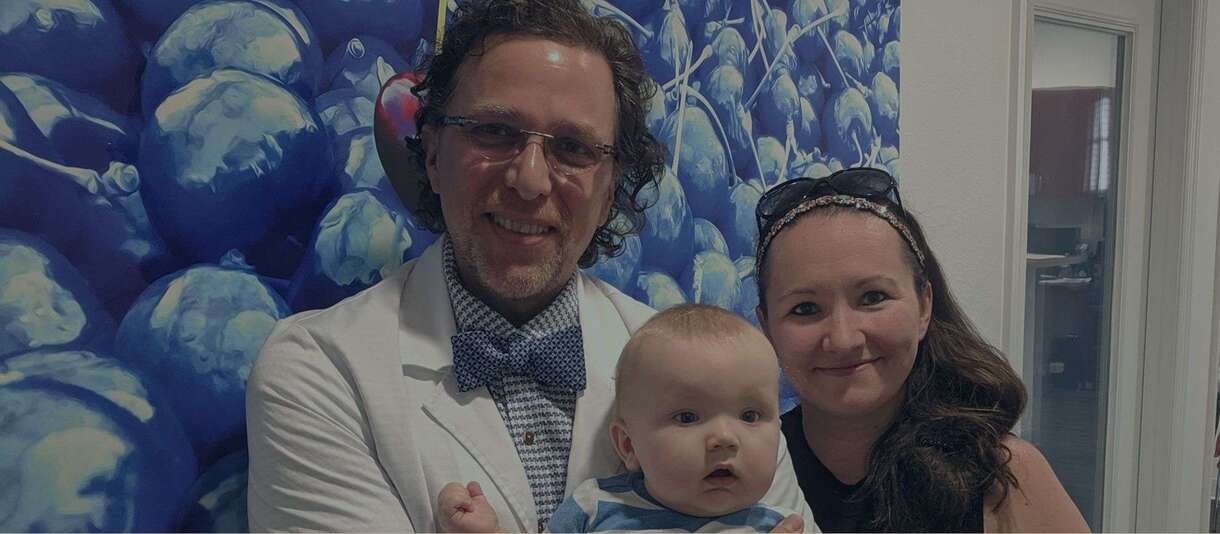By Margaret Ann Miille
STAFF WRITER
Michele Gibbs of Sarasota tried to conceive a child for almost three years before deciding Mother Nature needed a nudge.
At the recommendation of her gynecologist, the 39-year-old registered nurse and paramedic in June visited Dr. Julio E. Pabon, a reproductive endocrinologist who performs in-vitro fertilization at the Fertility Center of Sarasota.
“It was about our only option to have a biological child,” Gibbs said. “The chance of my getting pregnant was about as good as a coin toss — about 50 percent.”
She learned on Sept. 26 that she was pregnant, most likely with twins. The technology and expertise that made that outcome possible didn’t come cheaply. Gibbs estimates her total out-of-pocket costs could exceed $15,000, including fertility drugs and special procedures.
“It’s a pretty expensive choice,” she said. But without it, “people would have to live out their reproductive years disappointed every month.”
The Fertility Center of Sarasota, 5664 Bee Ridge Road [The new address: 5100 Station Way, Sarasota], is one of about 350 clinics that have cropped up nationwide since the 1980s, prompted by medical and technological advances and a society in which more women are postponing starting families.
Obstetrician-gynecologists in Southwest Florida say they welcome the local fertility clinic because it provides a convenient extension of the services they render. Its presence creates a minimal overlap of services, but no turf war.
Before Pabon opened his practice in late 1997 — initially in another professional complex near Doctors Hospital — these physicians had to send patients as far as Tampa or Fort Myers for the in-vitro procedure.
“That is a very difficult thing for a patient to do, because they have to see the doctor every other day for half a month,” Pabon said.
Pabon is the only physician performing the procedure in Charlotte, Sarasota or Manatee counties. He declined to disclose his annual revenues, but said his expanding client base and the growing number of in-vitro fertilizations he performs, estimated to surpass 120 this year, have exceeded expectations, and in two years he will be able to build a free-standing clinic with adjoining apartments for out-of-town patients.
He and his wife and business manager, Verneda, initially thought it would take them up to eight years to develop the niche business.
“Our plan was to start a small practice and build it gradually,” he said.
But the location and the rarity of his specialty — he is one of about 800 board-certified reproductive endocrinologists in the country and the only one in Sarasota, Manatee and Charlotte counties — accelerated that growth.
“On average, you need about 300 people to make a living, just to produce a level of specialty,” Pabon said. “In Los Angeles, you throw a rock and you hit a reproductive endocrinologist. If you had two guys here, we would be starving.”
According to the Society for Assisted Reproductive Technology in Washington, D.C., about 15 percent of women of childbearing age nationwide have received infertility treatment.
Assisted reproductive technology has been used in the United States since 1981 to help women become pregnant, most commonly through in-vitro fertilization. The procedure involves extracting a woman’s eggs, fertilizing them in a laboratory and then transferring the resulting embryos into the uterus through the cervix.
In-vitro fertilization increasingly has been performed in clinics run by infertility specialists called reproductive endocrinologists — physicians who typically undergo two or three years of formal training in reproductive endocrinology and infertility beyond that of an obstetrician-gynecologist.
The ticking clock
Live births occurred in 31 percent of fertilizations attempted in 1997 in women younger than 35; 26 percent for those 35 to 37 years old; 17 percent for women 38 to 40 years old; and 8 percent among women older than 40.As more women delay childbearing, their age plays a major role in success rates. The likelihood of a successful response to ovarian stimulation and progression to egg retrieval drops; so does the chance of embryos being transferred successfully and, ultimately, of pregnancy. Consequently, treatments that result in live births also decrease in number.
But slowing biological clocks aren’t the only reason women fail to conceive. Other problems include obstructed or damaged fallopian tubes, endometriosis, ovulatory dysfunction and low sperm counts in their partners.
About 100,000 children have been born in the United States using this advanced technology, including 20,000 of them last year.
The cost of in-vitro fertilization ranges from about $8,000 to $10,000 per attempt, placing it out of the realm of many people, especially if repeated tries are necessary.
“Certainly access is a very important issue,” said Sean Tipton, spokesman for the American Society of Reproductive Medicine. “One of the knocks you get on the reputation of infertility is that it’s a yuppie women’s disease, because there are people who can’t afford the treatments. Low-income women just don’t even bother.”
Patients who feel financially pressured to get pregnant on their first try tend to favor more aggressive treatments that, in turn, raise the risk of multiple births.
“Emotionally you are so driven to be successful,” he said.
At the heart of the cost issue is insurance. Florida is not among the 13 states that have some sort of infertility legislation on the books.
A push is on, however, at both the federal and state levels, to require insurance companies to pay for these treatments. Tipton said two bills were introduced this year at the federal level — one for government employees, another for private sector workers. Neither got beyond committees.
Resolve, a national infertility association geared toward educating couples and helping them get treatment, also supports efforts to require insurers to cover infertility procedures in Florida.
Barbara Fronczak, vice president of the South Florida association chapter, said a bill introduced last year and this year by state Rep. Debbie Wasserman Schultz, D-Weston, likewise stalled in committees.
“Infertility is a disease and should be treated like a disease. Why do we cover Viagra and penile implants for men but not infertility treatments?” Fronczak said.
Efforts to require insurance companies to cover infertility treatments are paying off elsewhere.
Seeking fairness
The commission invited both sides to settle the matter. If they don’t, the case will head to federal court, where it has the potential to set a precedent.The Equal Employment Opportunity Commission ruled this year that a New York company had violated the Americans with Disabilities Act and the Civil Rights Act when it denied insurance coverage for an employee’s infertility treatments.
That case was partly motivated by a U.S. Supreme Court ruling in 1998 that referred to reproduction as a “major life activity” in a case involving an AIDS patient.
Dr. Karen Harris, president of the Florida Obstetric and Gynecologic Society, said the cost for equipment and expertise justifies the high charge for in-vitro fertilizations, she said.
“A tubal reversal runs from $15,000 to $20,000, about the same as two cycles of in-vitro,” she said. “So dollar for dollar, you get more value going through in-vitro than going through surgery. If you have X amount of dollars to spend, it’s the best way to take home a baby.”
Referrals from OB-GYNs, former patients and reproductive law attorneys account for about half the business at the Fertility Center of Sarasota.
The other half is generated by aggressive marketing. Pabon estimates that advertising on the Internet alone has resulted in 30 percent of his referrals in the past six months.
About 25 percent of his patients come from Sarasota and Manatee counties; up to 90 percent live in Florida. The remainder come from other states and overseas.
Sarasota gynecologist Michael Swor, who refers patients to Pabon, said there’s only slight overlap of services between reproductive specialists and obstetrician/gynecologists.
“I think there is some crossover, but generally Dr. Pabon and most fertility clinics have their hands full taking care of the most specialized forms of fertility treatment, like in-vitro fertilization,” he said. “A lot of the treatment involves frequent visits. I think his clinic provides our community a more convenient access to specific high-tech fertility treatment.”
Small clinic, big results
Pabon said he achieves his rate by monitoring the progress of patients more closely than doctors at larger clinics, where women might see several in the course of trying to get pregnant. At the Sarasota clinic, the only medical professionals are he and embryologist Rajesh Srivastava, whom he hired last year.Pabon claims a success rate of up to 60 percent, compared with the national average of 27 percent for in-vitro fertilizations.
In-vitro fertilization accounts for about 75 percent of revenues generated at the center. Pabon also treats infertility with other methods, such as artificial insemination and reconstructive surgery, which he performs at Doctors Hospital of Sarasota and Sarasota Memorial Hospital.
Pabon also runs an egg donation program that has grown to include 65 donors. The success rate using donated eggs is higher than with in-vitro fertilization. Twin births occur about 15 percent of the time among women using either method. Triplets are rarer still.
Pabon reviews detailed family histories, health screenings — and sometimes psychological and IQtests — to arrange compatible matches between egg donors and recipients. A common request is for a child that will look the same as the mother who will bear it.
The clinic receives $7,500 for that service; the donor is paid privately by the recipient couple, usually between $2,000 and $2,500.
Pabon, 38, said he chose to specialize in infertility during his second year of medical school.
“I did residency in OB-GYN just so that I could do this business,” he said. “I got to see what specialists were doing. I thought it was a fascinating window to new medicine and gene therapy.”
Gibbs calls her pregnancy, made possible by medical advances, a great blessing.
“I grieved for the process of getting pregnant on my own naturally, without intense manipulation,” she said. “It was fleeting.”


